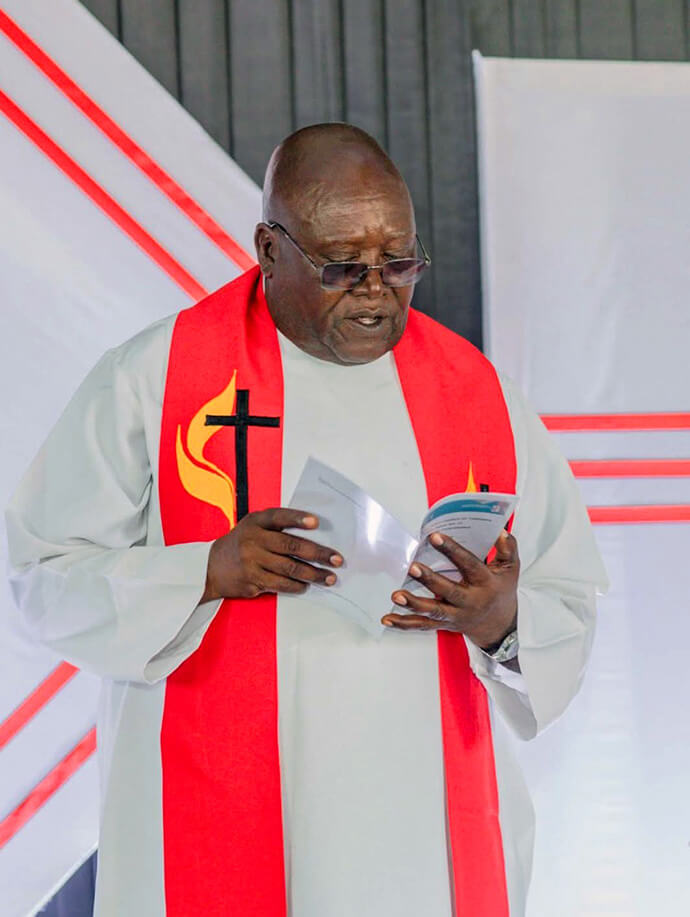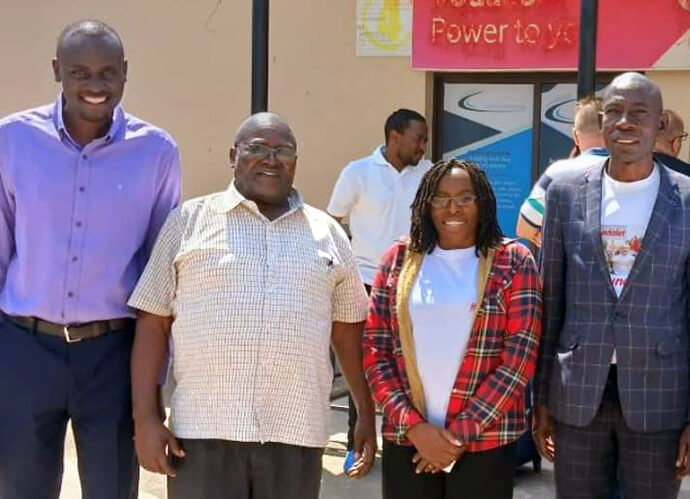Key points:
- The Rev. Abisay Lameck Juwakali, an advocate of holistic ministry combining evangelism, education and health, died Oct. 5 in a traffic accident.
- Bishop Mande Muyombo described him as an “inspiration to young pastors” and a pioneer of holistic mission.
- Under Juwakali’s leadership, the Sebring Mwanza Mission Center strengthened its education programs, St. Lazarus Hospital, and commitment to interfaith cohesion.
The Rev. Abisay Lameck Juwakali, director of the Sebring Mwanza Mission Center and an influential leader in Tanzania, died Oct. 5 at Bukumbi Hospital following a traffic accident. He was 69.
The accident occurred in the evening near the mission center, when he was struck by a vehicle while attempting to cross the street to his home. The driver fled the scene. An incident report has been filed at the Kigongo Ferry police station, and an investigation is underway.
Juwakali was a passionate advocate of the gospel lived out through concrete acts of service, friends said.
Appointed in March as the bishop’s representative and director of the Sebring Mwanza Mission Center, he was the driving force behind a vision that integrated spiritual growth with educational, health and community development.
Bishop Mande Muyombo, who oversees the Northern Katanga and Tanzania Episcopal Area, praised his commitment.
“Rev. Abisay was an inspiration to young pastors in terms of dedication to The United Methodist Church,” said Muyombo, who is also president of the United Methodist Colleges of Bishops in Africa.
“He embodied a holistic understanding of the gospel of Jesus Christ through personal and social holiness.”

Juwakali was born on April 4, 1956, in Mpanda, in the Tabora region of Tanzania. He had served The United Methodist Church since 1993. He was ordained a deacon in 2001 and an elder in 2005 by Bishop Pierre Nkulu Ntanda Ntambo, after obtaining his certificate at Kafakumba Pastors’ School in Zambia.
He served as district superintendent in Kigoma from 2005 to 2011, then in Dar es Salaam from 2011 to 2021, before taking over as head of the Mwanza Mission Center.
One of the most poignant anecdotes illustrating Juwakali’s faith concerns his refusal to abandon the most vulnerable children.
“Recently, I suggested that he close the mission center’s primary school due to lack of financial resources,” Muyombo said. “But he categorically said ‘no’ and told me that God would provide for the children’s needs.”
His conviction bore fruit. At the mission center, he strengthened educational and health infrastructure, notably St. Lazarus Hospital, and ensured that more than 120 students received a quality Christian education and food initiatives.
Many young people testify that Juwakali changed their lives. He helped young people become leaders, encouraged them to return to school and guided others away from destructive habits.
“I had lost all hope after my parents died, but Pastor Abisay helped me find a new home at the mission center,” said student Justine Mokolo.

His legacy lives on through those he helped to flourish.
Muyombo and other United Methodist leaders are working to ensure the continuity of Juwakali’s work.
The bishop said the United Methodist Board of Global Ministries has sent a new missionary, the Rev. Rebecca Maiko, to lead the mission center. She previously worked closely with Juwakali.
The bishop added that Maiko has already found “creative ways that will help transform the mission center,” ensuring that Juwakali’s holistic vision continues to be implemented.
For Maiko, Juwakali was a model of authentic and courageous leadership. She remembers the intensity of his passion for missionary work.
“Rev. Abisay was one of those people who were passionate about their work,” she said. “He devoted his time to serving and ensuring that everyone was committed to their responsibilities.”
She recalled that he would remind missionaries, “God has called us here.”
Even in the face of adversity, “he was courageous in every situation without fear,” Maiko said. “The late Rev. Abisay ... always encouraged me to be strong in difficult situations and told me ‘Haya ni mapito tu,’ which means that these are only trials, when things were difficult at the center.”
Maiko was also impressed by his authenticity and humility.
“He spoke his mind yet was easy to approach,” she said. Even children did not hesitate to come up to him, she said.
“Rev. Abisay, even at his age, valued growth and learning,” she said. “He encouraged a spirit of learning from one another, from those with higher education and those with many years of experience. He encouraged me to understand the culture.”
Subscribe to our
e-newsletter
This is a lesson that Maiko said she intends to honor in order to continue the work of her predecessor. “I will truly remember his leadership,” she said.
Juwakali was also a champion of ecumenical cohesion. He collaborated with Catholic, Lutheran and other faith leaders to organize joint prayer events and peace dialogues, building bridges of trust between different religious communities.
He believed in an inclusive church, seeking personal and collective transformation, and advocated for ecumenical and interfaith cooperation.
He leaves behind a legacy of projects that embody his vision of holistic ministry.
At the Sebring Mwanza Mission Center, he oversaw the Primary School Project, which aimed to expand classrooms and dormitories to provide quality education to more children. Similarly, under his leadership, St. Lazarus Hospital established itself as a pillar of community health, providing affordable and essential care, including maternal and child health services, to residents of the region.
“His leadership shaped the soul of the mission center,” said Ombeni Tiluganilwa, the manager of the United Methodist school and center.
Pastor Seni John added, “He turned problems into prayers and prayers into action.”
Juwakali is survived by his daughters, Happy Abisay, Grace and Bahati, and his wife, Estar Mkindwa Dadia.
The two-day funeral program for Juwakali allowed the community to pay last respects. A farewell service was held Oct. 9 at the Sebring Mwanza Mission Center. On Oct. 10, a funeral service was held at his home in the Tabora region, Kigoma District.
Addressing the Mwanza community and the Tanzania Annual Conference, Bishop Muyombo shared a message of hope.
“To the Mwanza community and the Tanzania Annual Conference, I say, we are the people of the Resurrection,” he said. “Let us continue to keep the legacy for Abisay. He will always be with us.”
Ally is a communicator for the Tanzania Conference. Londe is a UM News correspondent in Congo.
News media contact: Julie Dwyer at newsdesk@umnews.org . To read more United Methodist news, subscribe to the free UM News Digest.




